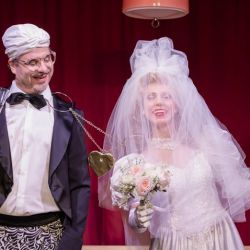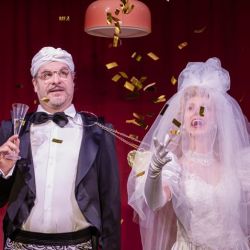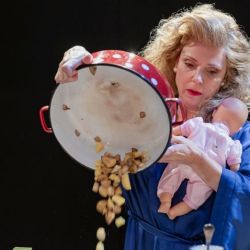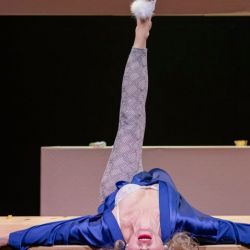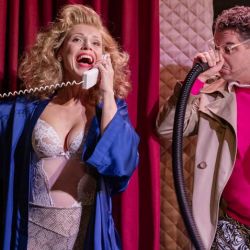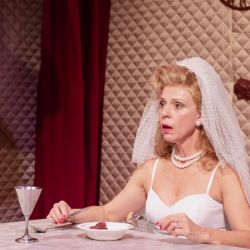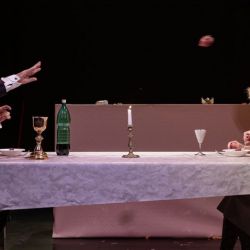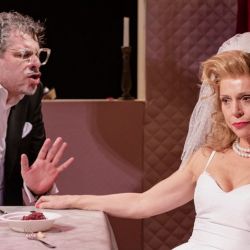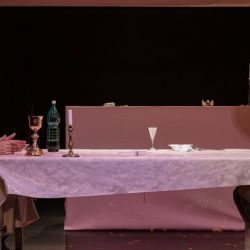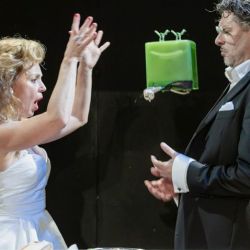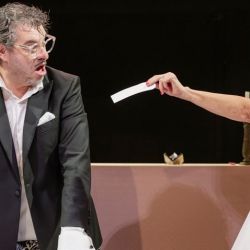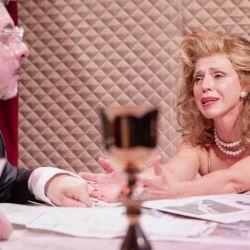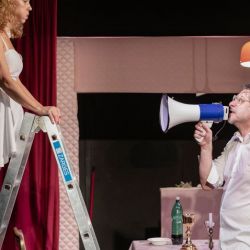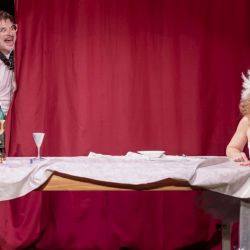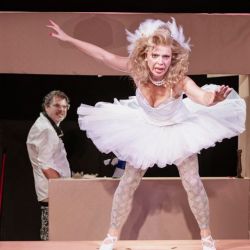A versatile artist, writer, poet, actor, director and impersonator, Emil Filipčič (Belgrade, 1951) studied directing at the AGRFT in Ljubljana and established himself as a writer and playwright with his vast body of work. Together with Marko Derganc, he authored a cult satirical radio play Butnskala, and recorded it for Radio Študent in the early 1980s, playing several characters. Filipčič was also one of the first associates of the Radio Ga Ga radio show. In 2011, he received the Prešeren Fund Award for his novel Problemi.
Filipčič focused on playwriting mainly in the 1980s and 1990s, when his plays were frequently produced in Slovenian theatres. With nine staged plays, he ranks among the most prolific Slovenian playwrights. Constantly imaginative and provocative, both in plays and fiction, Filipčič’s writing evades genre classification. Taras Kermauner called it ludic, later also impish, underlining the author’s grotesque, satirical and fantastic elements, as well as his signature black humour.
This Merry Home, a new comedy, premiered on 17 August 1996 at the Ohrid Summer Festival and in September 1996 at the SMG in Ljubljana, directed by Niko Goršič alias Nick Upper. Written at the end of Filipčič’s most prolific playwrighting period, it borders on the drama of the absurd, elegantly oscillating between the comic and the tragic, before it finally turns into a grotesque.
The plot centres on a married couple, Tončka and Polde. With their wedding photos still brand new, they nonetheless begin to reenact various scenes of their married life. A playful and happy beginning soon turns into a sour marital routine, infused with boredom and coarse verbal exchanges, culminating in mutual scolding, accusations, and threats, and ending almost in tragedy. Almost thirty years after this comedy with the undertones of male superiority was first written, it is vital to explore: “What has changed in gender relations since the inception of the play? Have the roles changed? All of which raises an interesting performance-related question: “What happens if the roles in the text are reversed?”
“It takes two to tango. Adam and Eve, Husband and Wife, Me and You. If we really love each other, we will bind ourselves and be bound by love. I and You turn into Us Two. Now, there are four of us: I, I and Us Two. At the beginning, all is rosy, as long as it is just Us Two, but then it becomes a bit unbearable, awkward, palpably tight. Now we would need to unbind from our commitments. I would like to be just I again, and so would you; and Us Two could go on holiday to Grandma Marinka's for a short while. And it is only when Us Two start growing apart and try to find our own selves, that This Merry Home begins ...”
Dejan Spasić, director
Director Dejan Spasić
Dramaturg Denis Poniž
Set designer and lighting designer Luka Martin Škof
Costume designer Barbara Drmota
Sound designer Leon Firšt
Choreographer Dušan Teropšič
Language consultant Živa Čebulj
Cast
Wife Manca Ogorevc
Husband Tarek Rashid
Opening 4 October 2024
Performance duration: 1 hour. No interval.
Music used in the production includes Canon in D by Johann Pachelbel, Non, je ne regrette rien by Edith Piaf and Por una cabeza by Carlos Gardel.
Stage manager, prompter Breda Dekleva • Lighting masters Andraž Ratej, Gregor Počivalšek • Sound masters Drago Radaković, Gregor Počivalšek • Property master Roman Grdina • Front-of-house David Vitez • Make-up artist and hairdresser Andreja Veselak Pavlič • Hairdresser Sibila Senica • Wardrobe masters Nika Fartelj, Maja Zimšek • Tailor Anita Kragelj • Seamstress Ivica Vodovnik • Head of construction Gregor Prah • Technical manager Aleksandra Štern • Assistant technical manager Rajnhold Jelen


